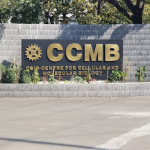Globally applicable ethical guidelines for ancient DNA research
Date : సెప్టెంబర్ 5, 2024

Hyderabad, 20th October, 2021: Rapid growth of ancient DNA research and its impact on archaeology and other fields has prompted the need for developing universally acceptable ethical standards to govern such research. These discussions have led the scientific community to consider best practices for sampling of human remains and carrying out scientific analysis in a way that is aligned with the various stakeholder groups. However, appropriate approaches to working with human DNA differ across world contexts.
This has led a diverse set of 64 scholars from 31 countries who are actively involved in ancient DNA research to develop a set of guidelines. The diversity of authors has been an effort towards embracing the complexities across the world. The guidelines have been published in the science journal Nature.
Dr. K. Thangaraj, Chief Scientist from the CSIR-Centre for Cellular and Molecular Biology (CCMB) and Director of the DBT-Centre for DNA Fingerprinting and Diagnostics, Hyderabad offered inputs from an Indian perspective in developing the guidelines. His expertise stems from starting the ancient DNA laboratory at CCMB about a decade ago along with late Dr. Lalji Singh, former Director of CCMB. This research has shed light on the mysteries of the human skeletons found in Roopkund lake in the Himalayas and helped establish identity of Georgian Queen Ketavan buried in the St. Augustine convent in Goa, India.
“Some of the ethical issues pertaining to analysis of human remains are globally applicable whereas some differ greatly across the world. It is, therefore, critical to articulate guidelines that are rigorous yet flexible enough to be appropriate for diverse local contexts. Our discussions with a truly international and diverse set of scholars was key to identifying principles that could be generalized,” says Dr. Thangaraj.
“Much of the writing on ancient DNA ethics has come from scholars thinking about issues that affect Native North Americans in the United States (US). US has had a terrible history of
colonial exploitation of Native American tribes by people of European descent, and descendants of the latter still have a dominant role in that country’s politics. Informed by this history, earlier scholars had suggested that indigenous communities or local groups who are descendants and stewards of the ancient remains should closely decide whether and how research should go forward on these remains. They had also suggested universality of this approach on DNA studies across the world,” he explains. This can be relevant for Africa where they have a legacy of ancient remains collected in unethical ways by colonizers and often sent abroad for research.
Dr. Thangaraj, however, has been concerned by the appropriateness of this suggestion for India. He says, “For India except regions like the Andaman Islands, it is meaningless to discuss the concept of indigeneity. Most populations have inter-bred with each other thousands of years back. Similarly, in many other parts of the world the local communities do not relate or represent the ancient populations of those regions due to migrations, socio-political conflicts and other reasons.”
“Focus on indigeneity can also lead to divisiveness and conflict, as has been evident in Europe. Scholars there had worked for decades to deconstruct narratives that claim ownership of heritage by specific groups. These found way to justify claims to territory in the Nazi period”, he adds.
The new set of five guidelines aim to circumvent these differences in global contexts of ancient DNA research. The contributing scholars believe these guidelines are strong, universally applicable, and they have committed to the guidelines in their own work going forward. They are as follows:
1. Abide by all regulations in the places where they work and from which the human remains
originate (since there cannot be one set of regulations for all)
2. Prepare a detailed plan prior to beginning any study,
3. Minimize damage to human remains,
4. Ensure data are made available following publication to allow critical re-examination of
scientific findings, and
5. Engage with other (non-scientist) stakeholders and ensure respect and sensitivity to
stakeholder perspectives.
“These globally applicable guidelines provide an excellent ethical framework for ancient DNA research in India,” said Dr. Vinay Kumar Nandicoori, Director, Centre for Cellular and Molecular Biology, Hyderabad. “We are very glad to have had a strong representation of Indian scientists contributing to the formulation of guidelines that are both applicable around the world and appropriate to our Indian context.”
Other Indian co-authors of the Nature paper include SPR Prasad at the DBT-Centre for DNA Fingerprinting and Diagnostics in Hyderabad; Arati Deshpande-Mukherjee and Veena Mushrif-Tripathy at the Deccan College in Pune; and Ganeshan Kumaresan at Madurai Kamaraj University in Tamil Nadu.


 Advertisement no 07/10 for the post Junior Scientist.
Advertisement no 07/10 for the post Junior Scientist.